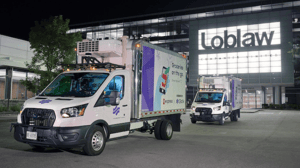Albertsons, Rite Aid Terminate Merger Agreement
Proposed $24B deal scuttled amid investor unease; next chapter not immediately apparent. The proposed $24B deal was scuttled amid investor unease; Albertsons walks away rather than boost offer.

The planned marriage between Albertsons Cos. and Rite Aid has been called off amid concerns that the drug chain’s investors wouldn’t approve of the $24 billion price tag just hours before they were set to vote on it.
The unraveling will apparently cost Albertsons a long-sought entry to the public markets as well as the company’s next CEO, but its board was unwilling to raise the price offered for its drugstore counterpart, the retailer said in a statement.
“Albertsons Cos. believes that the strategic rationale of the Rite Aid combination was compelling, including the $375 million of cost synergies and $3.6 billion of identified revenue opportunities. We disagree with the conclusion of certain Rite Aid stockholders and third-party advisory firms that although they acknowledged the strategic logic of the combination, did not believe that Albertsons Cos. was offering sufficient merger consideration to Rite Aid stockholders.”
The statement, issued late Aug. 8, continued: “Consistent with Albertsons Cos.’ disciplined approach to mergers and acquisitions, and after careful consideration of all information available to our board of directors through today, we were unwilling to change the terms of the merger.”
A spokeswoman told WGB late Aug. 8 that the company had no immediate comment beyond the issued statement.
Albertsons and Rite Aid announced their planned merger in February, in a deal that was approved by the boards of both Boise-based Albertsons and the Camp Hill, Pa.-based drug chain. Their plans called for a kind of reverse merger in which privately held Albertsons would get on the New York Stock Exchange through an acquisition of Rite Aid’s publicly traded shares. Rite Aid CEO John Standley would then succeed veteran Bob Miller as Albertsons CEO.
Albertsons, which is controlled by the private equity firm Cerberus Capital Management, has sought to go public for several years in part to address high levels of debt accrued as it grew from a small group of stores deemed unsellable when predecessor Albertsons Inc. was broken up in 2006 to a $60 billion 2,300-store grocery chain with stores across the country. Its acquisitions since 2013 included reuniting the once sold-off Albertsons stores and American Stores banners such as Jewel-Osco and Acme by buying them back from Supervalu. It also acquired both United Supermarkets and Safeway in 2015.
Albertsons also saw the Rite Aid deal as a means to differentiate from competitors, more than double the number of outlets it operated, and benefit from the ongoing convergence of the food and wellness fields. Albertsons officials noted that its customers who utilized the pharmacy were higher spending and considerably more profitable than food-only shoppers and that adding Rite Aid’s 2,500 stores would provide additional outlets to sell its private brands.
Albertsons said it remained “excited about the improving momentum, financial strength and industry leadership” of the company. “Our team has remained laser-focused on execution to drive our financial and operating performance, while ensuring we continue to meet and exceed the needs of our customers. As a result, we have achieved a number of significant milestones, including delivering consecutive quarters of top-line and bottom-line growth. And as part of the Safeway merger, which is delivering higher than expected synergies, we will be completing the systems integration of the Albertsons stores to in-house systems in September. We also have continued to differentiate ourselves through our best-in-class 'Own Brands' portfolio that is expected to add over 1,100 new items this year as well as through our expanding 'eCommerce offerings,' which grew 108% year over year in the first quarter.”
Its next step is not immediately apparent. Reports in 2017 had indicated in that Albertsons had interest in acquiring other publicly traded retailers such as Sprouts Farmers Markets, in part to reach the public markets after an attempt to launch an initial public offering on its own failed amid market uncertainty that accompanied food price deflation in 2016. It filed with the Securities and Exchange Commission to deregister 120.7 million shares of stock that were to be used in connection with the Rite Aid deal.
The breakup leaves Rite Aid in in similar uncertainty, and represents the third time that an agreement to sell itself in recent years failed. A planned acquisition of Rite Aid by Walgreens in 2016 was considerably trimmed back after federal antitrust regulators intervened, as was an associated plan for Fred's Inc. to acquire stores Walgreens would not buy. Rite Aid in a statement said it also disagreed with investors and advisers who had signaled disapproval of the Albertsons overture and said its board was now “evaluating governance changes at the company.”
“While we believed in the merits of the combination with Albertsons, we have heard the views expressed by our stockholders and are committed to moving forward and executing our strategic plan as a stand-alone company,” Standley of Rite Aid said in a statement. “We remain focused on leveraging our network of conveniently located retail pharmacies, our EnvisionRxOptions PBM and our trusted brand of health and wellness offerings. We will continue building momentum for key areas of our business like our innovative Wellness store format, highly successful customer loyalty program and expanded pharmacy service offerings, as we also enhance our omnichannel and own brand offerings to strengthen our competitive position and create long-term value for stockholders.”
Under the terms of the merger agreement, neither Rite Aid nor Albertsons will be responsible for any payments to the other party as a result of the termination of the merger agreement.
The proposed Albertsons-Rite Aid deal faced opposition from a number of investors, including Highfields Capital Management. Investor advisory firms Glass Lewis and Institutional Shareholder Services also urged investors to vote against the merger.
About the Author
You May Also Like






